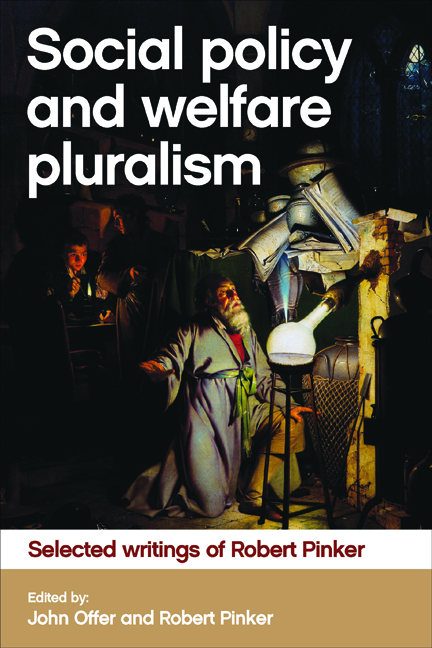Book contents
- Frontmatter
- Contents
- Acknowledgement
- Preface
- General introduction: Robert Pinker on rethinking approaches to welfare
- Introduction to Part One On social policy studies
- one The ends and means of social policy: a personal and generational perspective
- two Social theory and social policy: a challenging relationship
- three Stigma and social welfare
- four The welfare state: a comparative perspective
- five Richard Titmuss and the making of British social policy studies after the Second World War: a reappraisal
- Introduction to Part Two On social care, communities and the conditions for well-being
- six Report of the Working Party on the Role and Tasks of Social Workers: an alternative view
- seven The quest for community: from the Settlement Movement to the Griffiths Report: an historical perspective
- eight Citizenship, civil war and welfare: the making of modern Ireland
- Introduction to Part Three On welfare pluralism
- nine Golden Ages and welfare alchemists
- ten From gift relationships to quasi-markets: an odyssey along the policy paths of altruism and egoism
- eleven The experience of citizenship: a generational perspective
- twelve The right to welfare
- thirteen The prospects for social policy in the UK after the 2015 General Election
- Afterword On the post-Brexit prospects for social policy in the UK
- References
- Index
Preface
Published online by Cambridge University Press: 08 April 2022
- Frontmatter
- Contents
- Acknowledgement
- Preface
- General introduction: Robert Pinker on rethinking approaches to welfare
- Introduction to Part One On social policy studies
- one The ends and means of social policy: a personal and generational perspective
- two Social theory and social policy: a challenging relationship
- three Stigma and social welfare
- four The welfare state: a comparative perspective
- five Richard Titmuss and the making of British social policy studies after the Second World War: a reappraisal
- Introduction to Part Two On social care, communities and the conditions for well-being
- six Report of the Working Party on the Role and Tasks of Social Workers: an alternative view
- seven The quest for community: from the Settlement Movement to the Griffiths Report: an historical perspective
- eight Citizenship, civil war and welfare: the making of modern Ireland
- Introduction to Part Three On welfare pluralism
- nine Golden Ages and welfare alchemists
- ten From gift relationships to quasi-markets: an odyssey along the policy paths of altruism and egoism
- eleven The experience of citizenship: a generational perspective
- twelve The right to welfare
- thirteen The prospects for social policy in the UK after the 2015 General Election
- Afterword On the post-Brexit prospects for social policy in the UK
- References
- Index
Summary
Bob Pinker and John Offer have known each other since the late 1970s. However, the plan to collaborate on Social Policy and Welfare Pluralism: Selected Writings of Robert Pinker dates back to only February 2011. Then, Pinker, although retired from the London School of Economics as Professor of Social Administration, was still engaged with the Press Complaints Commission, and Offer was Professor of Social Theory and Policy at the University of Ulster, and about to embark on a stint as Chair of the Editorial Board of Sociology which met in London. Meeting from time to time at Pinker's home in Blackheath, two complementary ideas began to take shape. Offer believed that the breadth of Pinker's thought on social policy, which extended well beyond his very influential book of 1971, Social Theory and Social Policy, was in need of a detailed reappraisal, and Pinker had written a range of essays over recent years which we both felt amply justified being revised into the form of a book.
The most welcome award of a British Academy Small Research Grant in 2011 enabled Offer to take forward the first idea, itself now represented here as ‘Robert Pinker on rethinking approaches to welfare’, a general introductory review of Pinker's contribution to thinking about the study and practice of social policy. This essay is an extended and thoroughly revised version of an article called ‘Robert Pinker, the idea of welfare and the study of social policy: on unitarism and pluralism’, published in 2012 in the Journal of Social Policy (vol 41, no 3, pp 615-34). The second idea has now matured after due gestation in the shape of the remainder of this book.
Throughout the preparation of the book, we have each read and commented on the other's drafts. We had to agree, of course, on the outputs by Pinker to be included, and under what thematic groupings they were best ordered. On these matters, our discussions covered many memorable and convivial afternoons. On other matters, the aim has been to strive for clarity, not overall agreement for its own sake; although we should say that we knew already that in broad terms there was little likelihood of serious friction between us. And so it has proved.
- Type
- Chapter
- Information
- Social Policy and Welfare PluralismSelected Writings of Robert Pinker, pp. v - viPublisher: Bristol University PressPrint publication year: 2017

